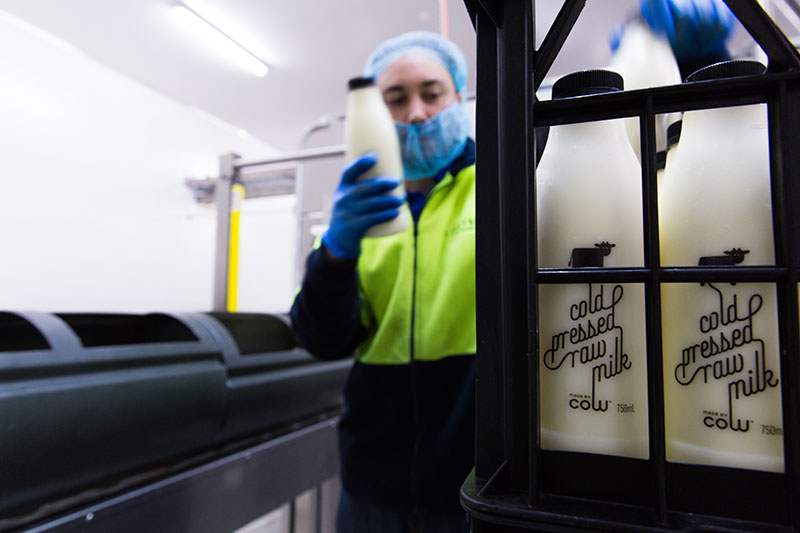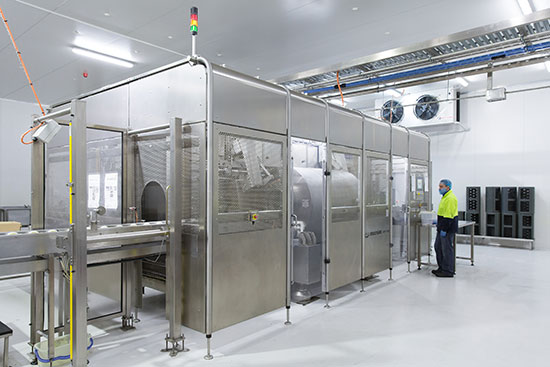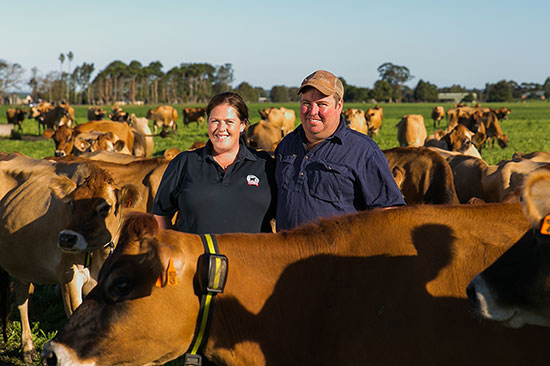Milking a Legal Loophole to Get (Nearly) Raw Milk to the Masses
Raw milk is illegal in Australia but that hasn’t stopped one startup from selling unpasteurized milk far and wide.
Milking a Legal Loophole to Get (Nearly) Raw Milk to the Masses
Raw milk is illegal in Australia but that hasn’t stopped one startup from selling unpasteurized milk far and wide.

In 2014, Made by Cow started experimenting with a cold-press process, a heat-free method they claim removes microorganisms like salmonella, E. coli, and listeria while maintaining milk’s pure flavor and “goodness,” they say on their website, which raw milk advocates prefer.
It took two years to perfect the process and get approval for retail sales, though Adam Cornell, co-founder of the Sydney-based startup, admits that the task of getting the cow-to-consumer product on store shelves was challenging.
“We were in touch with [the New South Wales Food Authority, the Australian equivalent of the FDA] from the beginning,” he says. “The more we tested, the more we learned; and the more we learned, the more we tested. Proving the science was difficult, but in the end it led to a patented method that met or exceeded the results obtained from heat pasteurization.”
Unlike pasteurization, which heats milk to 161 Fahrenheit for 15 seconds to kill pathogens, the cold-press process (called high-pressure processing or HPP) puts the bottled milk under intense water pressure without the addition of heat for several minutes, which Cornell claims, “inactivates the nasties in the milk.”
Offering consumers a legal alternative to raw milk, Cornell believes, could be a turning point for Aussie farmers.
“Our farmers get a bad deal here in Australia,” he says. In fact, it costs around 50 cents to produce one liter of milk [about $1.89 US per gallon] and local co-ops purchase milk for just three cents more per liter, according to Cornell, leaving little profit for the farmer. Although Cornell declined to provide specifics about how much Made by Cow pays its farmers, he says it’s “a lot more” than conventional dairy farmers earn.


To date, Made by Cow has partnered with local farmers Hayley and Stuart Menzies to raise 250 Jersey cows whose milk is bottled, cold pressed, and sold throughout Australia.
Producing a premium product – a 750 ml bottle of cold-pressed raw milk retails for $4.99 Australian, which is about $3.79 US – allows farmers to earn a premium wage, he says. The price has not deterred consumers from purchasing Made by Cow milk. Within 24 hours of delivering the first 3,000 750 ml bottles of cold-pressed milk to Australian supermarkets in June, most were sold out.
Through its current relationships with farmers, Made by Cow is producing 10,000 liters of almost-raw milk per week, roughly the equivalent of 2,640 gallons. As the business grows, Cornell hopes to add more farmers to meet demand. In the meantime, Cornell has plans to travel to the United States in the coming months to meet with FDA officials to talk about cold-pressing raw milk for sale in this hemisphere. “We have had hundreds of inquires from the US since we launched so we are confident it will be well received,” he says.
Indeed, with US farmers struggling to make inroads with raw milk – just 12 states, including Washington, Arizona, Nevada and Maine allow raw milk to be sold in retail stores and an additional 15 states permit sales at farmers markets or on the farm – a process that removes pathogens while preserving flavor could be a boon to the raw-milk market.
In Australia, though, critics warn that despite approval from the local food authority, allowing widespread sales of cold-pressed milk could prove problematic. In an article published in June in the Sydney Morning Herald, microbiologist and infectious disease specialist Peter Collignon expressed concern over the lack of research on the cold-press process, saying, “I do worry this is a marketing exercise for raw milk but without the science to show the process is anywhere near as good as pasteurization.”
Cornell, unconcerned with the criticism, stands by the safety of the process. Thanks to consumer demand and the blessing of the New South Wales Food Authority, Made by Cow hopes to build its cold-pressed dairy product empire, adding new products made with the same process.
“We hope the benefits of drinking the closest milk there is to raw milk will resonate throughout the community,” he says.
Follow us
This work is licensed under a Creative Commons Attribution-NoDerivatives 4.0 International License.
Want to republish a Modern Farmer story?
We are happy for Modern Farmer stories to be shared, and encourage you to republish our articles for your audience. When doing so, we ask that you follow these guidelines:
Please credit us and our writers
For the author byline, please use “Author Name, Modern Farmer.” At the top of our stories, if on the web, please include this text and link: “This story was originally published by Modern Farmer.”
Please make sure to include a link back to either our home page or the article URL.
At the bottom of the story, please include the following text:
“Modern Farmer is a nonprofit initiative dedicated to raising awareness and catalyzing action at the intersection of food, agriculture, and society. Read more at <link>Modern Farmer</link>.”
Use our widget
We’d like to be able to track our stories, so we ask that if you republish our content, you do so using our widget (located on the left hand side of the article). The HTML code has a built-in tracker that tells us the data and domain where the story was published, as well as view counts.
Check the image requirements
It’s your responsibility to confirm you're licensed to republish images in our articles. Some images, such as those from commercial providers, don't allow their images to be republished without permission or payment. Copyright terms are generally listed in the image caption and attribution. You are welcome to omit our images or substitute with your own. Charts and interactive graphics follow the same rules.
Don’t change too much. Or, ask us first.
Articles must be republished in their entirety. It’s okay to change references to time (“today” to “yesterday”) or location (“Iowa City, IA” to “here”). But please keep everything else the same.
If you feel strongly that a more material edit needs to be made, get in touch with us at [email protected]. We’re happy to discuss it with the original author, but we must have prior approval for changes before publication.
Special cases
Extracts. You may run the first few lines or paragraphs of the article and then say: “Read the full article at Modern Farmer” with a link back to the original article.
Quotes. You may quote authors provided you include a link back to the article URL.
Translations. These require writer approval. To inquire about translation of a Modern Farmer article, contact us at [email protected]
Signed consent / copyright release forms. These are not required, provided you are following these guidelines.
Print. Articles can be republished in print under these same rules, with the exception that you do not need to include the links.
Tag us
When sharing the story on social media, please tag us using the following: - Twitter (@ModFarm) - Facebook (@ModernFarmerMedia) - Instagram (@modfarm)
Use our content respectfully
Modern Farmer is a nonprofit and as such we share our content for free and in good faith in order to reach new audiences. Respectfully,
No selling ads against our stories. It’s okay to put our stories on pages with ads.
Don’t republish our material wholesale, or automatically; you need to select stories to be republished individually.
You have no rights to sell, license, syndicate, or otherwise represent yourself as the authorized owner of our material to any third parties. This means that you cannot actively publish or submit our work for syndication to third party platforms or apps like Apple News or Google News. We understand that publishers cannot fully control when certain third parties automatically summarize or crawl content from publishers’ own sites.
Keep in touch
We want to hear from you if you love Modern Farmer content, have a collaboration idea, or anything else to share. As a nonprofit outlet, we work in service of our community and are always open to comments, feedback, and ideas. Contact us at [email protected].by Jodi Helmer, Modern Farmer
August 9, 2016
Modern Farmer Weekly
Solutions Hub
Innovations, ideas and inspiration. Actionable solutions for a resilient food system.
ExploreExplore other topics
Share With Us
We want to hear from Modern Farmer readers who have thoughtful commentary, actionable solutions, or helpful ideas to share.
SubmitNecessary cookies are absolutely essential for the website to function properly. This category only includes cookies that ensures basic functionalities and security features of the website. These cookies do not store any personal information.
Any cookies that may not be particularly necessary for the website to function and are used specifically to collect user personal data via analytics, ads, other embedded contents are termed as non-necessary cookies.
The whole idea of pasteurisation is flawed. I grew up in the 1950s to 1970s in a country town of 25000 that was serviced by two family-owned dairies. The milk was not pasteurised or treated in any way in those days. We got free milk at school in glass bottles and delivered to homes by horse and cart every day. Nobody got sick drinking milk. This obsession with bacteria by the allopathic medicine regime is harming peoples health. A healthy human of average weight carries about 6kg of bacteria in and on their body, and the very bacteria they strive… Read more »